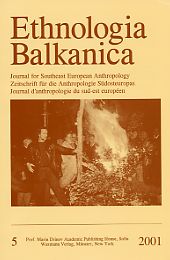Communisme ‹orthodoxe› et changement religieux: leçons du terrain bulgare
‘Orthodox Communism’ and Religious Change: Lessons from the Bulgarian Field
Author(s): Galja VălčinovaSubject(s): Customs / Folklore
Published by: LIT Verlag
Keywords: religious revival; national identity; Trăn (town in Bulgaria);
Summary/Abstract: The paper examines critically the view of the religious vacuum in communist societies, calling for a more nuanced appraisal of what is called post-totalitarian religious revival. With its characteristics of a Balkan and dominantly Christian-Orthodox society with a latent religious conflict on the one hand, and traditionally perceived as the most docile Soviet satellite on the other, Bulgaria appears to be particularly appropriate for testing this view. The paper tries to bring together and to compare three different aspects of the relationship between religion and politics under ‘real socialism’: the conflation of modernity, anti-clericalism and secularisation; the religious implications of the modernising process under a totalitarian regime; the margins of developing religious life in a society that exhibits an ‘atheistic’ ideology but in which religion provides an axis for the construction of national identity. These issues are discussed in the first two sections, while the third one offers an illustration, a case study in the town of Trăn, western Bulgaria. Finally, I propose a more complex view of religious life under the “orthodox communist regime” in which trends towards repression alternate with various subtle strategies of dominating the course of religious life and remodelling its expressions, thus contributing to its further evolution.
Journal: Ethnologia Balkanica
- Issue Year: 2001
- Issue No: 05
- Page Range: 59-77
- Page Count: 19
- Language: French
- Content File-PDF

